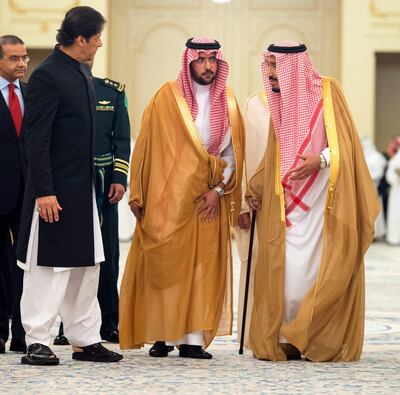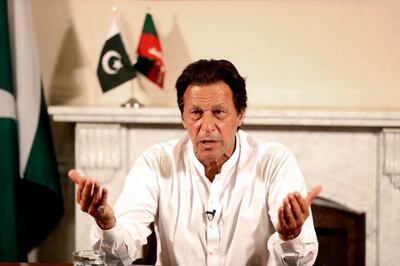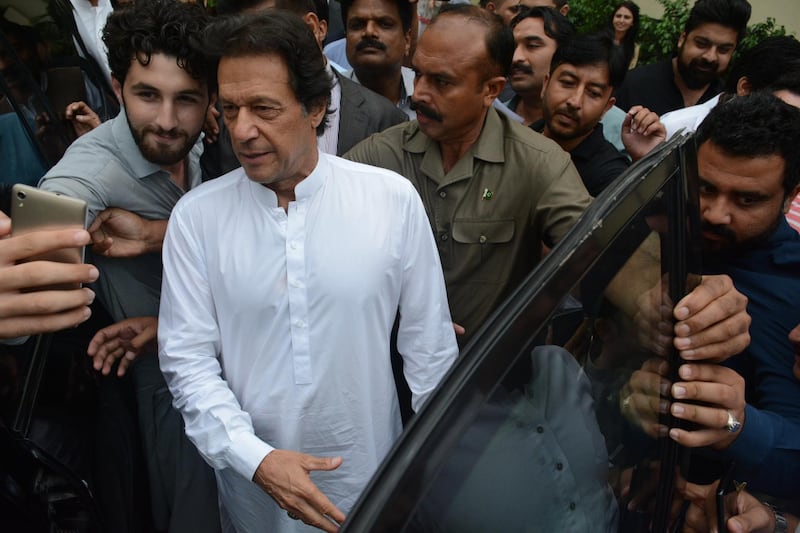Imran Khan says he needs two things. First Pakistan’s new prime minister needs time, and second he needs money. Time waits for no man and money doesn’t grow on trees. Nonetheless he is desperate and with the expectations of a beleaguered nation upon him – and the promises he has made outstanding – he has to deliver, and fast.
In one of his first briefings with foreign press since being elected on July 25, Mr Khan carried a depth of confidence. He walked into the office of his private house overlooking the small village of Bani Gala outside Islamabad wearing black sunglasses and a navy blue shalwar kameez, the traditional long tunic and baggy trousers of Pakistan. “Twenty-two years,” he announced, “the only political leader who struggled more was Jinnah, his struggle was 40 years.”
Muhammad Ali Jinnah is the beloved founder of the Pakistan Mr Khan hopes to reform.
The room is comfortable and lined with soft brown sofas. Photographs of a political rally and his two sons occupy his desk and back wall. Out the window is Rawal Lake and lush greenery covers a small terrace. It’s peaceful up there, a contrast from the clamour of Islamabad’s crowded streets.
Did he believe he was going to win this year’s general election? Yes. Does he think he can meet the high expectations his voters have for him? Of course.
“I have absolutely no doubt in my mind that we will deliver.” he said. “The reason is not so much that I have faith in my own abilities but more because of poor governance that has taken place in Pakistan over the past 10 years.”
The promises he has made are difficult to ignore. Among them: a pledge to end corruption in 90 days; the development of an Islamic welfare state; and the overhaul of Pakistan’s struggling economy. He told his hopeful Pakistan Tehreek-e-Insaf supporters that utilities would not be increased and has said he would rather commit suicide before asking for money.
But Mr Khan and his government have backtracked. When asked about utility commitments he said: “The great expectations from people, they are going to go through a bad time. Because whatever we do, you will have to raise the price of electricity, gas.”
On asking Pakistan’s allies Saudi Arabia and China or the International Monetary Foundation for money he said: “We have the worst debt crisis in our history. Unless we get loans from friendly countries or the IMF, we won’t have enough foreign exchange to either service our debts or pay our imports. So we are desperate at the moment.”

Mr Khan will attend Saudi Arabia’s investment conference this week and although he says he is shocked by the death of journalist Jamal Khashoggi, he feels he has to take the opportunity to seek friendly money for this country.
Pakistan has formally applied for its 13th bailout from the IMF. It was to be, and then not to be, then it was finalised. On Sunday, Finance Minister Asad Umar said this is the last time the country will seek assistance from the organisation. It is this kind of political flip-flopping that has created so much dissatisfaction among many Pakistanis.
What plagues Mr Khan’s reputation more is his relationship with the country’s all-powerful military. He insists he is not a military man and quickly declares that the establishment under General Qamar Javed Bajwa is the most democratic in Pakistan’s history, which has weathered numerous coups.
“I don’t know of any other establishment that has been so pro-democracy,” he says. “The amount of attacks on the army by political leadership is unprecedented.”
The government's line is: Nothing to see here, definitely not a military state that interferes in everyday politics. In contrast, Pakistani journalist Parvez Mir, who is a supporter of Mr Khan, said: "Like it or not this is an army state. This country is a developing democracy. It has its own habits."
_________
Read more:
Pakistan's Imran Khan struggles with shift from opposition candidate to incumbent
Pakistan's Khan says austerity begins at home
Iranian trolling operation blamed for nuclear spat
_________
Throughout the interview the prime minister winds his prayer beads through his fingers. He is sure of his answers but his tone can change depending on the topic. When press freedom was broached he was keen to reiterate: “I would never have succeeded if I did not have an independent media where I was able to put forward my views and that’s the only way I succeeded in an entrenched two-party system”.
Across from him his advisers interjected to say they have never instigated prosecutions against journalists and hope to introduce a Protection of Journalists Act. But when the issue of a well-known columnist being abducted in June was raised, they quickly demurred, saying the woman in question is not really a journalist but a coffee shop owner from Lahore.

Pakistan’s relationship with the United States has bounced between being essential allies and tiresome acquaintances. A feeling of mutual distrust has prevailed for years, with the US believing Pakistan could do more to stop militants finding safe havens within its borders and Pakistan believing the US continually undermines it while pulling ever closer to its foe India.
President Donald Trump’s first Tweet of the year was: “The United States has foolishly given Pakistan more than 33 billion dollars in aid over the last 15 years, and they have given us nothing but lies & deceit, thinking of our leaders as fools. They give safe haven to the terrorists we hunt in Afghanistan, with little help. No more.”
Prime Minister Khan’s thoughts on President Trump? A pause. “Our relationship with the Americans, I think, is probably going to be the best it has ever been in the last 10 years; and it’s going to be the best because of my always stated belief that there is only going to be one solution in Afghanistan and that’s a political solution.”
Afghanistan is "a very complicated picture," prominent Pakistani journalist and author Ahmed Rashid told The National this week. "Pakistan continues to harbour the Taliban and they could easily just chuck them out. There is a lot Pakistan can do to influence a potential settlement."
Removing militants from Pakistan is a futile task, according to the prime minister, who claims there are none there. “Right now we’ve managed to control the terrorism within Pakistan” he said, “but whatever we have now, terror attacks in Pakistan in recent days have come from across the border [with Afghanistan].”
Pakistan says it has no intention of taking sides in regional conflicts instead preferring to play the role of meditator. Mr Khan hopes to shuttle between regional rivals Saudi Arabia and Iran, for the sake of the economy but also the estimated 20 per cent of the population who are Shia. The prime minster also wants the US to drop sanctions on Iran for the sake of regional prosperity.
He may be used to having the eyes of his 210 million countrymen on him, but Mr Khan has stepped off the cricket field and is now playing a new game. Should he succeed he would be the first prime minister in the country’s history to complete a full term in office. But if he cannot deliver on his promises, Pakistan’s politically engaged populace will be quick to take to the streets to demand his removal.





